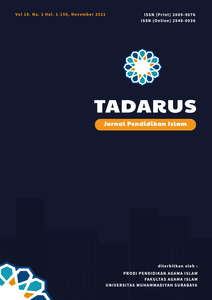TEORI KOGNITIF DALAM PERENCANAAN PEMBELAJARAN
DOI:
https://doi.org/10.30651/td.v10i2.14826Abstract
Belajar menurut teori kognitif pada dasarnya adalah peristiwa mental, suatu proses usaha yang melibatkan aktifitas mental sebagai akibat dari proses interaksi aktif dengan lingkungannya untuk memperoleh pengetahuan, pemahaman, tingkah laku, keterampilan nilai sikap. Berbagai teori belajar berdasarkan aliran kognitif ini diantaranya adalah teori pemrosesan informasi, teori perkembangan Piaget, teori penemuan Bruner, teori belajar bermakna ausubel. Karena teori kognitif mendukung keterlibatan aktif pelajar, penetapan tujuan, perencanaan, dan pemantauan diri adalah strategi yang harus didorong. Pendidik harus merencanakan cara bagi peserta didik untuk menerima umpan balik yang cepat atas upaya mereka sehingga peserta didik dapat lebih efektif merencanakan ke depan untuk situasi belajar di masa depan
References
Anwar, Chairul. Buku Terlengkap Teori-Teori Pendidikan Klasik Hingga Kontemporer. IRCiSoD, 2017.
Badyal, Dinesh K, and Tejinder Singh. “Learning Theories: The Basics to Learn in Medical Education.†International Journal of Applied and Basic Medical Research 7, no. Suppl 1 (2017): S1.
Budiningsih, C Asri. “Belajar Dan Pembelajaran,†2012.
Cherry, Kendra. “Piaget’s 4 Stages of Cognitive Development Explained,†2022. https://www.verywellmind.com/piagets-stages-of-cognitive-development-2795457#citation-3.
Donald, D, S Lazarus, and N Moolla. Educational Psychology in Social Context: Ecosystemic Applications in Southern Africa. Oxford University Press Southern Africa, 2014.
Ibda, Fatimah. “Perkembangan Kognitif: Teori Jean Piaget.†Intelektualita 3, no. 1 (2015).
Lefa, Baken. “THE PIAGET THEORY OF COGNITIVE DEVELOPMENT :AN EDUCATIONAL IMPLICATIONS.†Educational Psychology 1 (2014): 9.
Malik, Fatima, and Raman Marwaha. “Cognitive Development.†In StatPearls [Internet]. StatPearls Publishing, 2021.
Michela, Esther. “Cognitivism,†2022. https://edtechbooks.org/studentguide/cognitivism.
Muhadjir, Noeng. “Metodologi Penelitian Kualitatif,†1996.
Muhaimin, Nur Ali, Suti’ah, and Siti Lailan Azizah. Paradigma Pendidikan Islam: Upaya Mengefektifkan Pendidikan Agama Islam Di Sekolah. Remaja Rosdakarya, 2001.
Nuryati, Nuryati, and Darsinah Darsinah. “Implementasi Teori Perkembangan Kognitif Jean Piaget Dalam Pembelajaran Matematika Di Sekolah Dasar.†Jurnal Papeda: Jurnal Publikasi Pendidikan Dasar 3, no. 2 (2021): 153–62. https://doi.org/10.36232/jurnalpendidikandasar.v3i2.1186.
Schunk, Dale H. Learning Theories an Educational Perspective Sixth Edition. Pearson, 2012.
Shuell, Thomas J. “Cognitive Conceptions of Learning.†Review of Educational Research 56, no. 4 (1986): 411–36. https://doi.org/10.3102/00346543056004411.
Sukmadinata, Nana Syaodih. “Landasan Psikologi Proses Pendidikan,†2019.
Syah, Muhibbin. “Psikologi Belajar,†2013.
Trianto. Model-Model Pembelajaran Inovatif Berorientasi Konstruktivistik : Konsep, Landasan Teoritis-Praktis Dan Implementasinya. 5th ed. Jakarta: Prestasi Pustaka, 2011.
Warsita, Bambang. “Teknologi Pembelajaran Landasan Dan Aplikasinya,†2008.
Winkel, W S. Psikologi Pendidikan Dan Evaluasi Belajar. Gramedia, 1983.
Winn, William. “Some Implications of Cognitive Theory for Instructional Design.†Instructional Science 19, no. 1 (1990): 53–69.
Woolfolk, Anita. Educational Psychology. Pearson, 2017.
Wortham, Stanton. “Learning in Education.†GSE Publications, 2003, 82.
Zed, Mestika. Metode Peneletian Kepustakaan. Yayasan Obor Indonesia, 2004.
Downloads
Published
Issue
Section
License
Authors who publish with this journal agree to the following terms:
- Authors retain copyright and grant the journal right of first publication with the work simultaneously licensed under a Creative Commons Attribution-NonCommercial 4.0 International License that allows others to share the work with an acknowledgment of the work's authorship and initial publication in this journal.
- Authors are able to enter into separate, additional contractual arrangements for the non-exclusive distribution of the journal's published version of the work (e.g., post it to an institutional repository or publish it in a book), with an acknowledgment of its initial publication in this journal.
- Authors are permitted and encouraged to post their work online (e.g., in institutional repositories or on their website) prior to and during the submission process, as it can lead to productive exchanges, as well as earlier and greater citation of published workÂ




